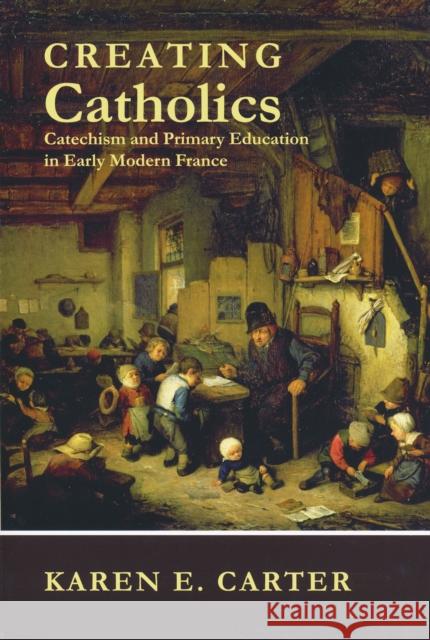Creating Catholics: Catechism and Primary Education in Early Modern France » książka
Creating Catholics: Catechism and Primary Education in Early Modern France
ISBN-13: 9780268023041 / Angielski / Miękka / 2011 / 328 str.
The religious education of children represents a critical component of the Catholic Reformation that has often been overlooked by historians of early modern Europe. In "Creating Catholics: Catechism and Primary Education in Early Modern France," Karen E. Carter examines rural schooling in France in the seventeenth and eighteenth centuries--the period when community-supported primary education began--and brings to light a significant element of the early modern period.
Carter scrutinizes Catholic religious education in rural parishes in France through its two leading forms: the explosion of Catholic catechisms for children and their use in village schools. She concentrates on educational opportunities for rural peasants in three French dioceses: Auxerre (in Burgundy) and Chalons-sur-Marne and Reims (in Champagne). Carter argues that the study of catechism in village schools was an integral part of a comprehensive program, implemented by both clerical and lay leaders, for the religious, ethical, and moral education of children. Her research demonstrates that the clergy and a majority of the lay population believed in the efficacy of this program; for this reason, parish priests taught catechism in their parishes on a weekly basis, and small village communities established and paid for a surprisingly large number of local schools so that their sons and daughters could receive an education both in basic literacy skills and, through memorization of catechism, in Catholic faith and practice.
"Karen E. Carter's "Creating Catholics: Catechism and Primary Education in Early Modern France" is a well-written, informative, and original piece of scholarship that helps to fill a large gap in our understanding of French religious life in the latter part of the early modern period. Carter shows how church and Bourbon state interests in promoting a devoutly Catholic and obedient populace intersected in the religious education of its children. Using a rich body of sources, she provides a much more textured understanding of the everyday functioning of primary school education than has so far been undertaken."--Megan Armstrong, McMaster University
"Karen Carter's book delivers a great deal more than its title promises. It rescues the history of French catechetical ambitions during the Catholic Reformation from serious neglect, and firmly anchors it in the practice of primary education within a regional context. Above all, she restores the agency of lay Catholics in an age of increased clericalisation by showing why they wanted schooling for their children and paid for it from their own pockets. This astute and economical combination of hitherto discrete subjects fills an important gap and offers historians new ways of approaching familiar questions." --Joseph Bergin, University of Manchester
"This book makes an excellent contribution to early modern history in general, and particularly to the fields of religious history and French history. The central argument that the teaching of catechism by parish priests and the broad instruction available at the petites ecoles found in most villages had a broad impact on the lives, particularly the religious lives, of townspeople and villagers, should interest historians, people in religious studies, and students of education." --Marc R. Forster, Connecticut College"











